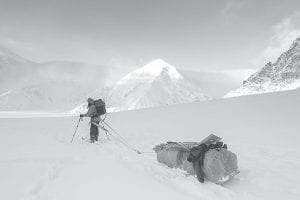Lonnie Dupre, age 51, once again was scuttled by the weather in his third attempt to summit Mount Denali during the dead of winter. Here he is shown pulling his sled loaded with 150 pounds of gear while his backpack contains about 50 more pounds. Deep snow plagued him early and fierce cold and wind drove him down the mountain after he climbed to 17,200 feet.

As he waited at his base camp at 7,200 feet to fly off the mountain, one could hear the resignation in the voice of Lonnie Dupre who had been beaten a third straight time by the weather in his attempts to climb Mount Denali in January, the coldest, darkest month of the year.
Deep snow plagued the adventurer the whole trip, even as he passed 11,000 feet, usually the cutoff for heavy snow in his path. Even coming back down from 17,200 feet, he had to fight through piles of snow and winds that reached 40-50 miles an hour.
“I’m really exhausted from the trip,” the Grand Marais Arctic explorer said in his audio recording as he waited for a plane to fly him back to Talkeetna, his Alaskan headquarters.
Dupre had just spent 22 days on Denali, reaching 17,200 feet, but extreme cold and winds coupled with a lack of supplies signaled the end for his bid to become the first person to climb solo to the 20,320-foot mountain peak in January.
Four days before he headed down, Dupre reached his camp at 17,200 feet and things looked good for a summit. However, once he got to his last stop before making a dash to the top, he ran into trouble.
First he had problems making a snow cave, telling his support crew that the snow was exceptionally hard and that after 12 hours of climbing he was bone tired.
Then things went from bad to worse for Dupre, who was on his 19th day of climbing. Once inside his shelter, Dupre found he couldn’t warm up.
“When he called his base camp at 4 a.m. on Sunday, it was -35 degrees F in the snow cave,” wrote his communications director, Stevie Plummer.
Cold, exhausted, and faced with a 12-hour back and forth trip to the summit, Dupre knew the end had come. The final nail was the weather forecast, which predicted high winds and more cold. Dupre knew he couldn’t get to the mountaintop and have enough energy or supplies to survive the trip down. Out of 16 climbers to make the mountaintop in the winter, six have died coming down.
Not all was lost, however. On his climb Dupre gathered microbe samples and conducted research for the Biosphere 2 project and for Adventures and Scientists for Conservation. All of this information, said Dupre, “will help scientist get a better understanding of how climate change affects the production of living matter in extreme environments.”
Dupre also got the heartening news that his excellent book Life on Ice: 25 Years of Arctic Exploration, published by Keen Editions, had been nominated for a 2013 Minnesota Book Award.


Loading Comments